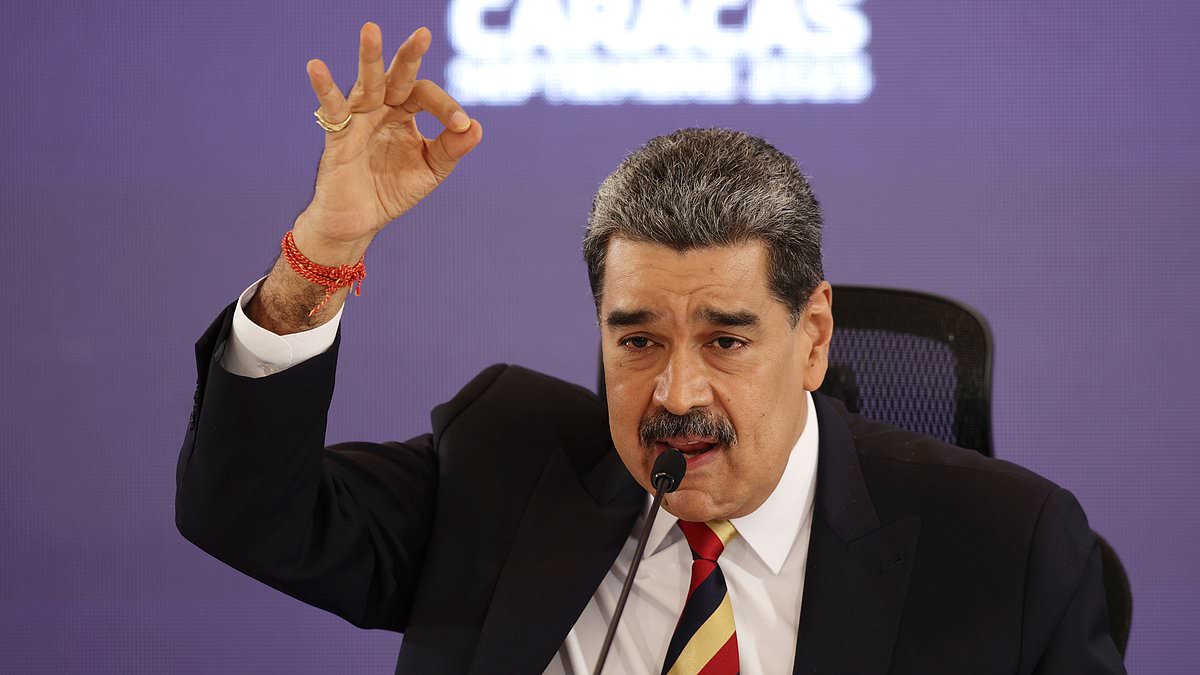Venezuela’s dictator Nicolas Maduro threatened to ‘declare a republic in arms’ if attacked by forces that the United States government recently deployed near to his country in the Caribbean.
Maduro said his country was at ‘maximum preparedness’ as he spoke during a news conference Monday in Caracas just as the White House prepared to boost its maritime force in the waters off Venezuela this week.
The United States has already ordered the deployment of spy planes, a warship and even a submarine to the Southern Caribbean Sea to address the growing threat posed by Latin American drug cartels.
‘In the face of this maximum military pressure, we have declared maximum preparedness for the defense of Venezuela,’ Maduro said of the U.S. deployment, which he characterized as ‘an extravagant, unjustifiable, immoral and absolutely criminal and bloody threat.’
Maduro did not elaborate on what ‘declaring a republic in arms’ would entail.
But he warned that U.S. military action against Venezuela would ‘stain’ President Donald Trump’s ‘hands with blood’.
‘President Donald Trump, the pursuit of regime change is exhausted; it has failed as a policy worldwide,’ Maduro said. ‘You cannot pretend to impose a situation in Venezuela.’
The dictator also called Secretary of State Marco Rubio a ‘warlord’ pushing for action in the Caribbean to topple Venezuela’s Left-wing regime.
The U.S. has not signaled any planned land invasion by the thousands of personnel being deployed.
Still, Maduro’s government has responded by deploying troops along its coast and border with neighboring Colombia, as well as by urging Venezuelans to enlist in a civilian militia.
Maduro also used his news conference to insist that he was the legitimate winner of last year’s presidential election.
But ample and credible evidence has shown the contrary, prompting several countries, including the U.S., to not recognize Maduro as Venezuela’s president.
Maduro, sworn in to a third six-year term in January, added that his regime maintains two lines of communication with the Trump administration, one with the State Department and another with Trump’s envoy for special missions, Richard Grenell.
Since the July 2024 presidential election, Venezuela’s political opposition has been urging the U.S. and other countries to pressure Maduro into leaving office.
Last month opposition leader María Corina Machado thanked Trump and Rubio for the deployment of the vessels, describing the move as ‘the right approach ‘toward Venezuela’s government, which she described as a ‘criminal enterprise’.
The Navy now has two Aegis guided-missile destroyers — the USS Gravely and the USS Jason Dunham — in the Caribbean, as well as the destroyer USS Sampson and the cruiser USS Lake Erie in the waters off Latin America. That military presence is set to expand.
Three amphibious assault ships – a force that encompasses more than 4,000 sailors and Marines – were expected to enter the region this week, a defense official told The Associated Press on the condition of anonymity.
The deployment comes as President Trump has pushed for using the military to thwart cartels he blames for the flow of fentanyl and other illicit drugs into US communities and for perpetuating violence in some U.S. cities.
In February, the State Department designated several cartels as foreign terrorist organizations. They notably include Mara Salvatrucha (also known as MS-13) and Tren de Aragua along with others.
The department said the gangs constituted a ‘national security threat beyond that posed by traditional organized crime’.
The Trump administration added a few more to the list in July; the Venezuelan Cartel de los Soles, or Cartel of the Suns, explaining that the cartels were run by the President of Venezuela, along with other leaders on his staff.
The Treasury Department also accused Cartel de los Soles of giving material help to other cartels, like the Sinaloa Cartel in Mexico and Tren de Aragua, asserting they were ‘threatening the peace and security of the United States’.
Secretary of State Marco Rubio put out a statement days after, blasting Nicolas Maduro, saying his regime is ‘not a legitimate government’ and that he is ‘not the president of Venezuela’.
He added that Maduro, ‘has corrupted Venezuela’s institutions to assist the cartel’s criminal narco-trafficking scheme into the United States’.
In an interview last week, Rubio explained that designating these cartels as terrorist groups would permit the U.S. to use all the tools in their arsenal, like intelligence agencies and the Department of Defense.
‘We cannot continue to just treat these guys as local street gangs. They have weaponry that looks like what terrorists, in some cases, armies, have,’ Rubio said.
‘Drug dealing is the kind of terrorism they’re doing, and it’s not the only.’
